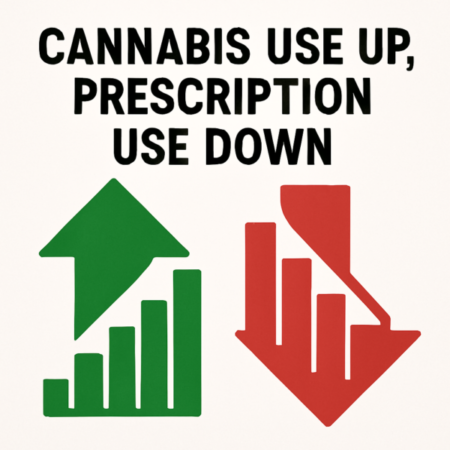
There’s a growing body of research looking at how cannabis laws affect more than just access to flower and concentrates, they’re impacting the pharmaceutical industry too.
A new peer-reviewed study titled “The Effects of Medical and Recreational Cannabis Laws on Prescription Drug Claims in Commercial Group Insurance Markets” found that legalizing cannabis, both medical and recreational, led to a noticeable reduction in prescription drug claims across several therapeutic categories.
Here’s what that means in plain language:

The study focused on data from commercial insurance markets, meaning individuals who aren’t on Medicare or Medicaid. Think younger and middle-aged professionals, not just older adults. Researchers found that in states with legal cannabis access:
This backs up a larger trend we’ve been watching: when people have the option to use cannabis legally, many use it instead of a prescription drug, at least for certain conditions.
This isn’t a fringe theory anymore. We’re seeing major market shifts. Previous research found that Medicare and Medicaid saw billions in cost savings following cannabis legalization. Now that same trend is showing up in the private sector.
Several pharmaceutical companies have explicitly identified cannabis as a risk factor in their filings with the U.S. Securities and Exchange Commission (SEC).
For example, in 2019, Insys Therapeutics, a manufacturer of a synthetic opioid filed for bankruptcy after facing lawsuits for deceptive marketing practices. Before that, it lobbied against cannabis legalization in Arizona while simultaneously investing in synthetic cannabinoids.
These filings and lobbying records confirm cannabis is viewed as a market disruptor for them.
There’s no conspiracy, just economics. Cannabis is relatively affordable and often perceived as a more natural or less invasive alternative. (Another win for nature!) And when insurance companies see fewer claims for certain conditions, that affects everything from drug pricing to insurance policy structures.
Here’s what the study didn’t say:
What it does suggest is this: access to cannabis gives people more options and they’re using those options.

As a Tech & Education company, we’re not in the business of overpromising. But we are in the business of making the tools available to people looking to take control of their own well-being.
Research like this confirms what many cannabis users have known for a while, the plant has therapeutic potential, and when it’s accessible, people will use it with intention.
We’re here for it. Responsibly.
Want to go deeper into the data? Click here.
A note from the author: Your interest in my content is always appreciated. Feel free to let me know what you’re interested in learning about next!
Sign up for our newsletter to get the latest from the Rite Innovations team.